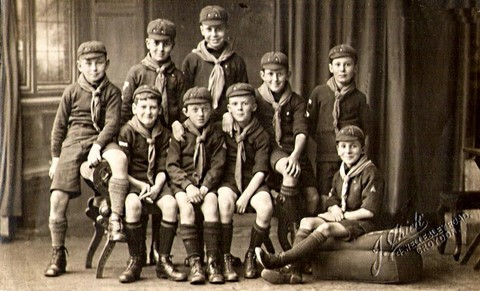Boy Scouts in Hartlebury
One of the articles featured in our Discovery magazine in 2018 focussed on the involvement in Hartlebury of the Scouts during WW1. They did a considerable amount of work to help the war effort.
The Hartlebury Boy Scouts Troop was formed in about April 1911 by local residents and Lord Hampton of Waresley Court. This was only a few years after Lord Baden-Powell had founded the Boy Scouts in 1908.
The Hartlebury Scouts generally met twice a week on Wednesdays and Saturdays between 7pm and 9pm. There were around 70 meetings in a year. They had one weekend camp and one weeks' summer camp that apparently took place at Sharpley Pools.
The first annual report, produced in 1912, was handwritten by Lord Hampton himself, who was the Scoutmaster. At that time the Troop consisted of 24 scouts in three Patrols called The Hounds, The Eagles and The Woodpigeons.
In the summer of 1914 the Troop were at their summer camp when the First World War broke out, and as a consequence they came back home early. The minutes of the Troop Committee meeting of 15th July 1914 record a scheme to be undertaken by the Scouts, which says "The Scoutmaster explained the Scheme by which warning notices were to be distributed to farmers by Scouts during Army Manoeuvres.” He reported that the area allotted to the Hartlebury Troop included the Parishes of Hartlebury and Elmley Lovett. There followed a list of around 60 occupiers of land in the Parishes based on acreage, with the names of individual scouts who were allocated to the various locations.
The annual report for 1915 suggests that a good deal of the work done by the Scouts that year was public war service. This included supplying a weeks' guard for the Kidderminster Reservoir on more than one occasion, and helping with hop picking at Shelsley. Three or four of the Troop helped at the Post Office on Christmas Eve and Christmas Day. And, from March 1915 the Troop were helping as orderlies at Hartlebury Castle Hospital. Twenty one public service war badges were gained by members of the Troop during this period.
As Lord Hampton was an army officer, and had gone to war, his sister, the Hon. Mary Pakington took over from him as Scoutmaster. It is also noted that sometime during the war the Patrol known as The Eagles had changed its name to The Otters.
The Troop continued to be very active, with the 1916 annual report indicating that the number of meetings in a year had increased to 90. Mary Pakington reported that two of the Troop (A. Hodges and L Deridder) had earned 100 days war service, and 4 of the Troop (A. Hodges, T. Guest, N. Ilsley and A. Hurdman) had earned 100 days coast watching. During the first 3 months of 1916, members of the Troop were on duty at the Hospital and the Troop had 5 scouts on coast-watching duty.
Sometime during 1916, the Troop gave 4 performances of a Scout play—twice for the French Red Cross Fund, once for the Mission Fund, and once for the Hospital. Lord Hampton also visited the Troop whilst on leave from Egypt. It is believed that the Troop gave a programme of entertainment on 26th & 27th April 1916 at Hartlebury Parish Room in aid of the French Wounded Emergency Fund. This included a drill, instrumental solos, songs, a comic boxing display, a demonstration of "how to keep fit", and a short play called The Laurel Crown (which appears to have been written to commemorate St. George’s Day, and the 300th anniversary of Shakespeare's death).
By 1917, Mary Pakington reported that the Troop numbers had reduced to 20 members with 70 meetings in the year. Some members of the Troop had reached military age, and had therefore joined up. But a Cub group had been formed. In the last quarter of 1917 some 5cwt of waste paper was collected and a sum of £1.15s.2d was sent to the Mayor of Worcester's Homes for Disabled Sailors and Soldiers.
By 1919/20, perhaps to celebrate the end of the war, the Patrol known as The Hounds changed its name to The Lions.
In her report for 1920 Mary Pakington wrote "The Hartlebury Troop begins its tenth year of existence under happy auspices - the outstanding event of 1919 having been the return of the Scoutmaster, Lord Hampton from active service." The Troop was back up to full strength of 24, although there had been some losses and gains in the year. She explained that "the three Deridders left England in March after some 3 years in the Troop, and have since formed a Patrol in Belgium, called after the Woodpigeon Patrol."
The Troop helped in the Peace Day Celebrations and also on three occasions at dinners for the returned soldiers.
In 2012 the Society received from a village resident records of the Hartlebury Boy Scout Troop during the years 1911–1925. These papers are now stored in our Archive.

